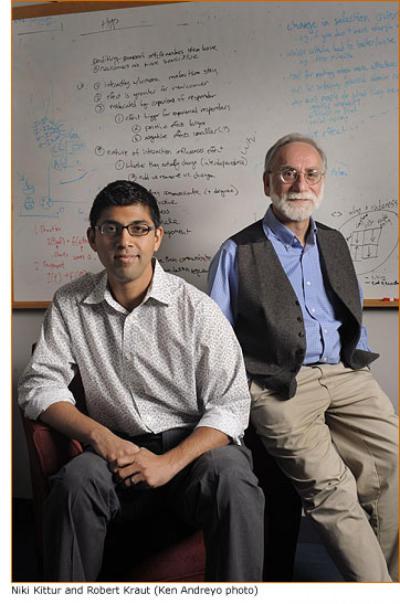Kittur, Kraut Earn NSF Grant to Study Analogical Innovation

Great innovations in science and technology often result from analogy. Someone may see a video online or read an article that inspires them to create the Next Big Thing — like the mechanic who invented a technique for saving babies trapped in the birth canal after seeing a YouTube video about extracting corks stuck in wine bottles. Although the Internet offers many potential solutions that could creatively be applied to new problems, inventors' and designers' fixation on surface features often prevents them from seeing the deep connections that would allow them to take advantage of those good ideas.
HCII faculty members Robert Kraut and Niki Kittur hope to solve that problem through their new three-year, $500,000 National Science Foundation grant, "Distributed Analogical Innovation."
Kittur and Kraut will investigate ways to distribute analogical processing — using analogy to inspire innovation — among multiple people instead of one individual. Their research team will conduct empirical studies to rigorously explore and characterize the benefits and limitations of distributed analogical innovation, and then generalize these findings in the context of two real-world innovation environments: the Industrial Research Institute, a consortium of research managers from many innovative companies and government agencies; and CienciaPR, a cross-disciplinary community of scientists.
"Psychologists have built detailed theories about how individuals innovatively solve problems through analogy," Kraut said. "Many HCI researchers have built clever, but atheoretical systems to harness the wisdom of crowds to support innovation. Our goal is to blend these two approaches by building a useful, scientific foundation for distributed analogical innovation that integrates cognitive and social theory about how analogy works with engineering insights from computer science and design to improve the ability of groups to innovate.”
"We usually think of analogical discovery as a lone genius having a 'Eureka!' moment. But with the amount of information in any given field growing tremendously, we need new ways to scale up analogical innovation," Kittur said. "Our goal is to distribute the process of analogy over many individuals so that they can together find novel solutions to hard problems that they wouldn’t have alone."
Read more about their project on the NSF website.

